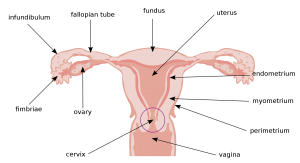What is an Enlarged Uterus?
If you’ve heard the words “enlarged uterus” thrown around by your doctor or friends, you may be curious about what an enlarged uterus entails. Also known as a hyper uterus, An enlarged uterus implies that there’s perhaps more activity in the uterus than is considered usual. While there is no exact measurement for a “normal-sized” uterus, a normal-sized uterus can be compared to the size of a clenched fist or a small apple.1

Most women associate an enlarged uterus with pregnancy, but that’s not the only reason your uterus can expand. Large or multiple fibroids can also cause an enlarged uterus. When fibroids grow up to the size of an avocado or larger, they can cause bloating, pressure in the pelvis, heavy bleeding, weight gain, and a protruding abdomen that can be noticeable.
If you are experiencing symptoms of a swollen uterus, we suggest contacting your doctor as soon as possible. An enlarged uterus can usually be detected during a physical exam and then confirmed via ultrasound or MRI.
If fibroids are found to be the cause of the issue, we recommend consulting a fibroid specialist for personalized treatment recommendations.
Symptoms Of An Enlarged Uterus With Fibroids
Having a swollen uterus is just one of the possible symptoms you may experience if you have fibroids. Some women with fibroids may not experience any symptoms; others may struggle with chronic pain or discomfort.
Common fibroid symptoms include:
- Menorrhagia or heavy bleeding lasting more than 10 days per month
- Severe pelvic pain or cramping
- Anemia caused by heavy bleeding
- Bleeding between menstrual cycles
- Pain during intercourse
- Frequent urination or difficulty emptying the bladder
- Constipation
- Lower back or leg pain
The most common symptom of an enlarged uterus with fibroids is bleeding, including heavy and long periods or bleeding in between periods.
Those who experience an enlarged uterus and fibroids may also notice:
- Weight gain
- Bloating
- A feeling of fullness in the lower abdomen
- A change in the way their clothing fits
Struggling with fibroids is usually associated with physical pain or discomfort, but fibroids can cause stress and emotional suffering. An enlarged uterus can affect a woman’s self-confidence, body image, and even love life.
Some of our patients state that they are no longer comfortable wearing certain types of clothing, or are embarrassed to wear a swimsuit. Others confide that they don’t feel confident with their partner during intimacy.
Along with poor body image and low self-esteem, heavy bleeding from fibroids can cause worry and fear of bleeding through clothes in public. Some women state that living with fibroids has caused them to feel as if they had no control over their bodies and prevent them from enjoying activities they used to love.
Can an Enlarged Uterus Make My Stomach Stick Out or Feel Bloated?
An enlarged or swollen uterus caused by fibroids can cause a protruding abdomen. Uterine fibroids are benign tumors that develop in the uterus. While some fibroids are as tiny as seeds, they can grow as large as a melon. When they grow large, they can make your stomach stick out.
Their location isn’t limited to inside the uterine cavity. Fibroids can grow outside the uterus, and within the uterus lining. Fibroids can also attach themselves to the uterus wall by a stalk-like growth called a peduncle.
Although not generally considered dangerous, fibroids can cause damage to the bladder and bowel, as well as impact fertility.
More commonly, fibroids cause a range of painful, uncomfortable, and disruptive symptoms.
What Causes an Enlarged Uterus?
Enlarged uterus causes can vary. You may experience an enlarged uterus as a result of a range of health conditions, including uterine fibroids, pregnancy, adenomyosis, and certain types of cancers involving the reproductive organs.
Large or multiple fibroids are a common cause of an expanding uterus.If the fibroid(s) grow larger within the uterine cavity, they may expand the uterus just like a pregnancy does. If the fibroid(s) grow larger outside into the uterine wall, they may press on surrounding organs.
To determine what is causing your symptoms, we recommend contacting a fibroid specialist for a full evaluation.
Fibroid Treatment for Enlarged Uterus
If you believe your enlarged uterus may be caused by fibroids, we encourage you to talk with a fibroid specialist. At USA Fibroid Centers, our highly experienced specialists can perform an ultrasound or MRI to diagnose your fibroids Afterwards, we can work with you to create a personalized uterine fibroid embolization (or also referred to as UAE) treatment plan.
Explore Your Options with USA Fibroid Centers
We offer a minimally invasive procedure called Uterine Fibroid Embolization, which we consider to be the gold standard for fibroid treatment. By shrinking your fibroids, UFE can alleviate difficult symptoms like heavy bleeding, pelvic pain, and an enlarged uterus without side effects of more invasive procedures.
Uterine Fibroid Embolization offers many benefits over fibroid surgery, including:
- No hospitalization
- Performed in a one-time appointment less than an hour
- Less risk
- No stitches or scarring
- Shorter recovery period
- Uterus remains intact
- Fertility is preserved
We believe that minimally invasive, outpatient fibroid treatment can help improve both your physical and emotional health. When you are ready to take the next steps, give us a call at 855-615-2555 or schedule a consultation online.
